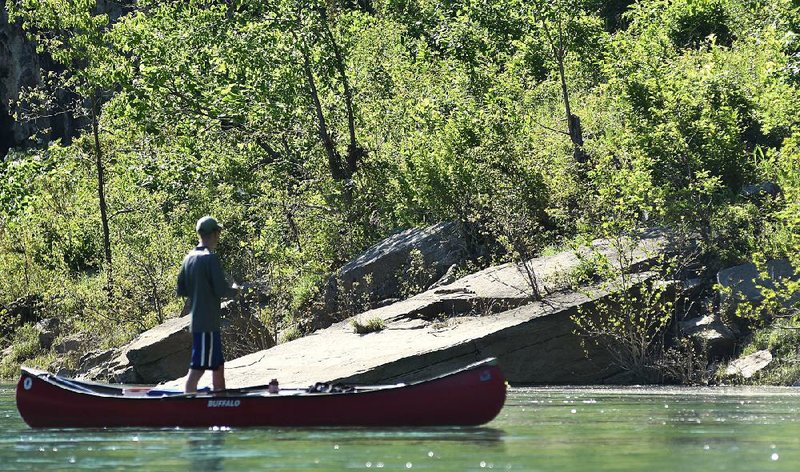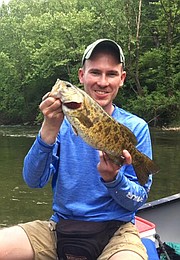YELLVILLE -- Float fishing with my friends is like a tournament.
We don't formally compete, but we are all very competitive.
All of us love to fish with Zoom Tiny Lizards. Trailing the column as I usually do, I can't hope to catch anything behind this bunch unless I fish differently than they do.
That was the pattern May 19-20 when Bill Eldridge of Benton, Matthew Eldridge of Waco, Texas, Ed Kubler of Benton, Ray Tucker of Little Rock, Richard Phelan of Benton and I fished the Buffalo National River and Crooked Creek.
We rightly assumed that the rain-swollen Buffalo would be too high for camping on the gravel bars. Instead, we made a base camp at Rush Recreation Area. That gave us equal access to the Buffalo River and Crooked Creek without having to carry camping gear in our canoes.
After pitching camp at Rush, we drove to the Highway 14 access for the 10.5-mile float to Rush. Ordinarily, it would be impossible to float that distance in a day and spend any time at all fishing. In fact, it usually takes us two days, including two nights camping on gravel bars.
Last Sunday, we did it in just over four hours. The gravel bars where we usually camp were about 3 feet underwater, and the water was too swift and deep for the way we like to fish.
We were pleased, however, at the absence of the thick algae that made the Buffalo virtually unfishable the past several years.
I used two lures. One was a tube jig, or "gitzit," with an internal weight that makes the lure snagless. The other was a River2Sea Whopper Plopper, a topwater lure. I caught seven fish. Five bit the Whopper Plopper, including two that were about 14 inches.
As always, we spent the first night feasting on Kubler's custom ribeyes, with corn on the cob and baked potatoes.
We hit Crooked Creek early Monday to float from the Mark Oliver Access to Kelly's Slab, at the Fred Berry Conservation Education Center. The creek was also swift and high, but the day had a different vibe. We all felt confident, eager and excited.
Bill Eldridge's canoe began the trip without a rider. It escaped while the rest of us organized our boats, but Matthew Eldridge dashed downstream in his boat to corral it.
It was a harbinger.
We began catching fish almost immediately. Phelan and I doubled up on smallmouths on opposite sides of a bottleneck. From there, everyone spread out. However, I noticed that the dominant strategy was for the others to pull ashore at runs and bottlenecks and wade fish.
I wrote those areas out of my script. Instead, I nosed my canoe into slower bankside water and eddies that flowed over rocks. I cast the gitzit downstream and slowly hopped it back upstream among the rocks. It was a good tactic that yielded results immediately.
My gitzit was a Yum Tube in pumpkinseed/red flake. It's a big, bulky bait that fish seemed to hit tentatively. I missed a lot of strikes from what felt like big fish. Smaller fish hit it more aggressively.
Midway through the float, I navigated a tricky rapid that required a sidestep. The current folded sideways over a rock. The side draft easily could overturn an inattentive or inexperienced paddler.
As I entered the pool at the bottom of the rapid, most of my group fished from the bank. Tucker and Bill Eldridge sat in chairs eating sandwiches.
"Have any problem with that rapid?" Eldridge asked in a cheerful voice.
He asked everybody the same question, in the same sing-song voice. Tucker fumed.
"I flipped in that rapid. I lost everything," Tucker said. "I lost my fishing rod. Both of my paddles. My glasses. Everything."
Tucker was alone when it happened. His inflatable life vest did not inflate when he entered the drink. He grabbed a low-hanging tree along the bank and held on. He was able to extract his phone and call Eldridge, who dashed to his rescue.
"Your fishing rod won't be more than 40 feet from where you went over," I said.
"Even if you find it, how are you going to get it?" Tucker asked. "It's fast and deep all through there."
Bill Eldridge and I hiked to the scene. Calculating the timeline, I went about 40 feet downstream and peered into the water. Eventually it parted enough to where I was able to distinguish a dark, linear shape on the bottom. I looked closer and saw a gold glint from the spinning reel's bail.
"Hold my beer," I said, handing my koozie to Eldridge.
Yes, I really did say it.
Grasping an overhanging tree for balance, I waded into the current. I slipped my foot under the rod, lifted and grabbed it before the current swept it away.
Farther down, Eldridge found Tucker's glasses.
Phelan recovered one of Tucker's paddles about 3 miles downstream.
After hearing how many fish Matthew Eldridge caught, I made a crucial adjustment. I resorted to an old favorite, a Yum Craw Papi. It's a tube bait that looks like a crawdad, but it's more petite than the Yum Tube. I caught hundreds of fish with it from 2006-08, but I haven't used it since.
The Craw Papi was precisely what Crooked Creek's smallmouths wanted, especially the bigger ones. Most of my fish from that point forward were 141/2 to 143/4 inches.
Near the end, I entered a tricky rapid that fed a pool I wanted to fish. The easier, more logical path veered wide of the pool. I was committed when the stiff wind blew me right into a rock in the middle.
The canoe spun and almost capsized, but I managed to right it.
One of my rods broke in the melee, and my wristwatch vanished. I pulled to the bank to reorganize my gear and tossed my inflatable life jacket to the bow, where it landed in water. The water activated the device, which inflated with a startling whoosh and rip as the bladder tore away from its Velcro fasteners.
I hadn't seen my friends in hours, and with my jig rod broken, it was time to call it a day. And what a day it had been. I caught about 25 fish. That isn't bad mopping up behind such excellent anglers.
As often, Matthew Eldridge caught the biggest fish, including one that was about 18 inches long.
When I stepped out of my boat, Tucker noticed the water sloshing around the bottom. He pinched my wet sleeve, and he knew what had happened without me saying a word.
It made his day.
Sports on 05/26/2019

